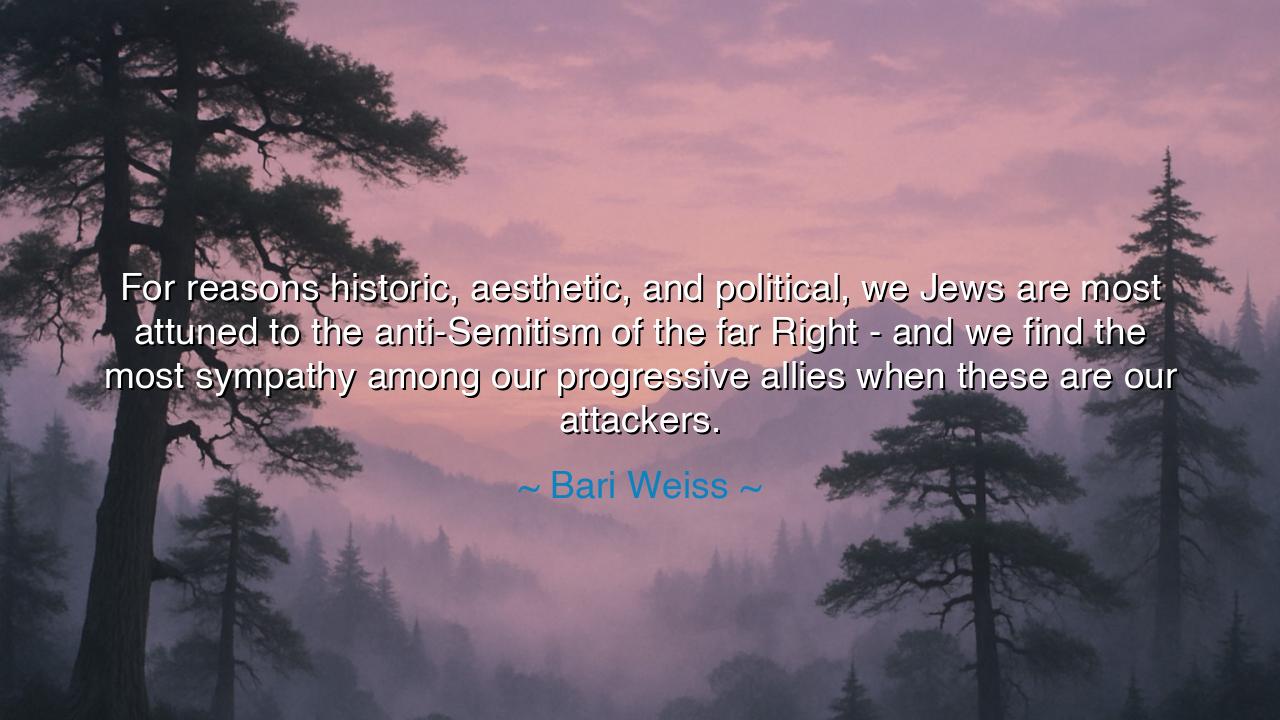
For reasons historic, aesthetic, and political, we Jews are most
For reasons historic, aesthetic, and political, we Jews are most attuned to the anti-Semitism of the far Right - and we find the most sympathy among our progressive allies when these are our attackers.






In the vast scroll of human history, few peoples have been more shaped by persecution and displacement than the Jewish people. Bari Weiss’s words, “For reasons historic, aesthetic, and political, we Jews are most attuned to the anti-Semitism of the far Right - and we find the most sympathy among our progressive allies when these are our attackers,” reveal the profound understanding of a people who have endured generations of hatred and oppression. Her statement speaks to the historical relationship between Jews and the forces of extremism, highlighting the ways in which history, identity, and politics intersect in the modern world.
To understand the deep resonance of Weiss’s words, we must first look to the history of the Jewish people. From the ancient Egyptians, who enslaved the Israelites, to the Romans, who destroyed the Second Temple and scattered the Jews to the four corners of the earth, the Jewish story has been one of survival amid constant threat. Throughout history, Jews have been persecuted, marginalized, and targeted by the forces of xenophobia and hate. The Middle Ages saw them demonized as the perpetrators of societal ills, while the Holocaust in the 20th century represented the zenith of anti-Semitic hatred, as six million Jews were murdered in a systematic attempt to wipe out their existence. It is within this historical context that Weiss’s insight about being “attuned” to the anti-Semitism of the far Right becomes clearer—Jews, as a people, have been forced to remain vigilant to the forces of extremism that seek to destroy them.
The aesthetic component of Weiss’s statement points to something deeper—identity. The Jewish people have developed a unique and vibrant culture over thousands of years, rich with art, music, literature, and philosophy, a culture that has always been threatened by those who wish to see it erased. The ancient world was filled with numerous societies, many of which sought to assimilate or destroy the Jewish way of life, seeing it as a challenge to their own dominance. The image of the wandering Jew, constantly on the move, subject to displacement and exile, is not just a metaphor but a reality etched into the very soul of the Jewish people. The progressive allies that Weiss refers to are those who understand that the struggle for Jewish survival is not merely political but also cultural—a fight to preserve the deep and unique identity of a people who have survived centuries of oppression.
Politically, Weiss’s statement speaks to the current alignment of political forces. While the far Right has historically been associated with nationalism, exclusion, and xenophobia, many progressive movements have fought for the rights of the marginalized, including Jews. But, as Weiss points out, the very progressive allies who may stand against anti-Semitism in principle sometimes find themselves in conflict when those same allies fail to recognize or support Jews in the face of modern anti-Semitism. In this modern age, the battle is no longer just about survival, but about recognition—recognition of the unique forms of hate that target Jews, not only from the far Right but sometimes from progressive spaces, as well. In ancient Greece, Socrates said, “The unexamined life is not worth living.” In the same way, the unexamined fight against anti-Semitism must be one where Jews are not only defended but also understood as part of the larger human struggle for equality.
The ancient Romans provide an instructive example. As Judea fell under their control, the Jews were seen as a people who defied the norms of Roman imperialism and polytheism, and they were persecuted for it. But within the Jewish resistance lay not just hatred for Roman rule, but a deep desire to preserve their faith, their identity, and their way of life. These ancient struggles for freedom and identity are not dissimilar to the modern struggles against anti-Semitism—the challenge to protect one’s culture and beliefs from forces of destruction that seek to wipe them out. Just as the Jews were persecuted by the forces of the Roman Empire, they are still often targeted by those who would seek to rewrite history and erase the distinctiveness of Jewish identity.
The deeper lesson in Weiss’s statement is the need for unity in the face of oppression. Jews, throughout history, have often found themselves alone, fighting for their survival, their culture, and their right to exist in a world that has too often rejected them. The progressive movement offers hope, but the challenge is for all of society to understand the nuances of the fight against anti-Semitism, not just from the far Right, but from all corners of the political spectrum. The fight for Jewish dignity must be a collective one, where allies recognize that the Jewish people are not a monolith—but rather a diverse group that has endured for millennia, offering contributions to the world in ways both profound and lasting.
The action we must take is one of awareness and solidarity. In recognizing the specific challenges that Jews face, we must extend our support and sympathy not just in principle but in practice. The fight against anti-Semitism is not just a political stance but a moral responsibility—one that requires understanding, solidarity, and action. We must learn from the past to ensure that the future is one where all peoples, including Jews, can live with respect, dignity, and freedom, unburdened by the shadows of hate.






AAdministratorAdministrator
Welcome, honored guests. Please leave a comment, we will respond soon